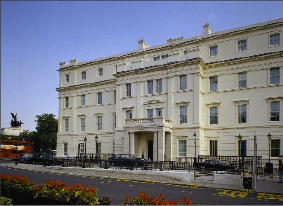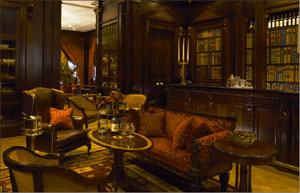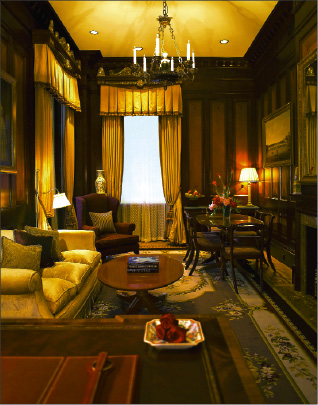- Home
- Media Kit
- Current Issue
- Past Issues
- Ad Specs-Submission
- Ad Print Settings
- Reprints (PDF)
- Photo Specifications (PDF)
- Contact Us

![]()
ONLINE

London Luxury
Editors’ Note
A fourth-generation hotelier, Geoffrey Gelardi assumed his post at The Lanesborough in 1990. Prior to that appointment, he served as Managing Director of the Sorrento Hotel in Seattle and the Hotel Bel-Air in Los Angeles.
Property Brief
A five-star ultra-deluxe property situated on London’s Hyde Park Corner, The Lanesborough, a St. Regis Hotel, (www.lanesborough.com) occupies an 1827 landmark building that was restored to its original grandeur. The 52 rooms and 43 suites are decorated in Regency style, evoking the ambience of a 19th-century townhouse. Located in elegant Knightsbridge, the property is minutes away from the exclusive shopping of Harrods and Sloane Street. The Lanesborough is known for its award winning afternoon tea. Guests may also enjoy a drink in the Library Bar, which offers an extensive array of vintage cognacs. The hotel boasts a Spa Studio, a Fitness Studio, a business center, concierge services, and six venues for meetings and social events.

The Lanesborough
In terms of the challenges we’ve seen in financial markets, have you seen an impact on business travel to London and, more specifically, on business at The Lanesborough? Looking forward, are you optimistic for growth?
We have seen some immediate effects of it. A couple of small groups had to cancel their reservations. The financial sector is probably our largest market. But it’s not as bad as one might have anticipated.
As far as the future is concerned, it’s very difficult to say. We’re in uncharted waters, and the amount of time that it could take for people to regain confidence is difficult to estimate. But we are not looking at any growth in the next year or so.
The Lanesborough is known to have the most up-to-date, fresh, and current feel. Are you happy with the product you have today, and do you see any plans or projects on the horizon?
We are constantly trying to change and get better and improve our product and our offerings, so we have lots of plans. We just finished a major renovation that went on for close to four years, a section at a time, and we are now anticipating a much larger refurbishment program starting in 2010, where we will be spending approximately £80,000 per room.
From a technology standpoint, it’s a similar story. We are constantly updating and making sure that we have the latest technology available to our guests, and we have continued to offer all of these amenities with no additional charge to the guest. In fact, I believe we are the first hotel in the world to offer to all our guests free landline phone calls to the United States and European Union countries.
We hear about deluxe rooms and executive rooms in most hotels being booked first, followed by the suites. At The Lanesborough, your suites are more popular and are booked very quickly. Do you have the right breakdown of product in that area, and are you happy with the quality and range of suites you offer?
It really depends on the time of year. For six months of the year, we fill from the top down. And then for the other six months, it’s more of what I would call a normal hotel where it’s controlled from the bottom up, or the middle tier, and then it pushes up into the suites during the slower months. But the months of May, June, July, September, and November are the months that have the most suite demand.

The Library Bar
Many talk about the challenge of running a successful hotel restaurant. In terms of your new restaurant, Apsleys, have you been happy with that business? How important is the local community to the success of the restaurant?
The success of a hotel restaurant is vitally important to how the hotel is perceived in its market. For example, more than 70 percent of the guests who eat in our restaurant are from outside the hotel. That’s a good ratio to have, because it means that the restaurant is successful within the community and is not totally reliant on hotel guests, which many are. That is one of the reasons we made the change earlier this year to The Conservatory. We wanted to have a full concept change. We thought that the food concept that we had had for the past 17 years needed to be revamped, so we went with the Italian theme. There are a lot of new Italian restaurants opening, and they’re all doing extremely well. The reason is that people like Italian food, more than they like any other ethnic food you can think of; it’s the most popular food in the world. It’s important that a restaurant be successful in its own market, because when we look at the origin of reservations, we see that the local community makes up a very large percentage
You also offer high-end beauty products through your Spa Studio with La Prairie and Comfort Zone. In the true luxury segment today, do you have to offer a spa package with a selection of therapies and treatments? Is it much more than just a fitness offering?
We survived for many years without a spa, but we created the spa about four years ago, and it has been successful. I think it is important that we are able to offer luxury spa treatments, but I don’t think they are the be-all end-all of a superb hotel, though some people may feel differently and think that it is necessary to offer that today. I think there are very few people who won’t stay at a hotel because it doesn’t have a spa. If your service and your product are of high quality, people will still stay there. However, there is a small minority that always looks for a spa element in ultra-deluxe hotels.
In terms of your facilities, are they primarily for more intimate events at a very high level, or do you also focus on broader, larger social events?
On the weekends, we do a lot of weddings and social events, but during the week, it’s almost exclusively small business meetings and board of director meetings.
As a hotelier of many years’ standing, you have always talked about and focused on the people side of the business, and service with the human touch. Is it challenging to offer all the technology without losing human contact?
We specifically design our technology to not interfere too much with our guest contact. By technology, I’m talking about high-speed Internet, the availability of laptops, and mobile phones where guests can be reached anywhere in the hotel – the kind of technology that assists businesspeople in doing what they have to do without having to run down to the business center every five minutes, for instance. We try not to do things such as having guests check out through the TV. We have a system here whereby they don’t have to check out anyway, especially if we know them, because we have all the information we need, and we can just forward them the final bill. Our technology is geared to help our guests do whatever they want to do.
You have so many guests who come to The Lanesborough on a regular basis and like to see the same faces when they visit. You have been very successful in keeping your people in an industry with pretty high turnover, as you have many employees who have been there since the beginning. What is it about the culture of the property, or the property itself, that has made it so exciting and helped your people stay loyal?
That comes from a number of different aspects of operation. First of all, we have to make it a nice place to work, because it helps if people are happy in their work environment. Second, we make it clear that longevity is a very important part of our work ethic, and longevity is rewarded in many different ways, including financially. But our employees understand that there is only one way to give guests good recognition, and that is to have the same people in the same place year after year.
Looking back to when you opened this hotel, could you have imagined that you would be leading it this many years later? There are many who say hoteliers have the personality to either enjoy opening or enjoy running, but you seem to be happy doing both.
Opening is always exciting, and I have had expanded responsibilities whereby I’ve opened hotels all over the world from a corporate perspective while at the same time running The Lanesborough. But running a hotel like this, that has maintained a number one position in its market for close to 15 years, gives me a lot of satisfaction. And until somebody comes up with a better offer, I’m happy to stay here.

The Buckingham Suite living room
You’ve been in this business for many years, you’ve led many properties, and you know the business well. You have the financial pressures from owners that come with running a property, but there are now additional areas to consider, such as technology, spa development, celebrity chefs, branded restaurants, and the whole food and beverage package. The business has become more intricate. Is your role more of a generalist, and are the days of the old-time hotelier, greeting guests in the lobby, gone?
I certainly hope not; that’s all part of it. The other parts are elements that change within any industry, which are great things to offer your guests, but to what level you use them and whether they become a feature of the hotel will depend on the hotel’s location and the dynamics of the operation. A restaurant, depending on who you put in there, is used as a marketing tool, and it can certainly help if you pick the right person, such as a celebrity chef, for example, and the restaurant becomes popular. So these are just different elements of operation. I don’t think they’re any better or worse than they used to be. In the final analysis, hoteliers are there to facilitate their guests’ needs, and the meeting and greeting and getting to know the guests is as vitally important as ever. You get feedback from your guests once you know them, which is an important element in understanding what they want. If you rely on feedback from your guests that you get through your employees, you are always going to have a slightly slanted opinion. They’re going to tell you to some extent what you want to hear and not what they think could possibly be an improvement or were problems that guests had during their stay. Once you get to know your guests, you get very frank and honest feedback, and many of the elements that we put into our capital improvements are stimulated by guest comments.
In terms of the pressures on the business because of technology, in a broad sense, but also because of technology such as e-mail, cell phones, and BlackBerrys, how challenging is it to find a work/life balance? In this industry, can you ever really get away from the business?
You’re asking the wrong chap, because I don’t like being away from my business. My work is a great deal of my play. I don’t mind being interrupted if it’s for the right reason on the weekend or when I’m on holiday. I’m a little more grumpy in the middle of the night, but I would rather address problems when they happen than come back later and find they haven’t been handled correctly, and all my executives know that. They also understand that I don’t want to be bothered for nothing, but if there are issues that need to be addressed, then I’m happy to address them at the time they need to be addressed, whenever that may be.